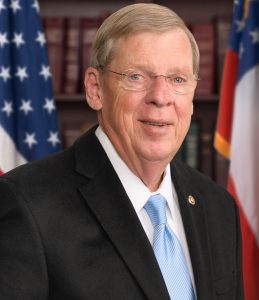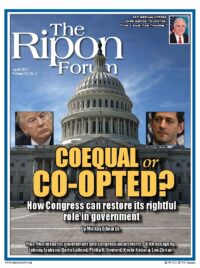
This year, a businessman took office as president. President Trump’s promise that Washington would work differently on his watch resonated with Americans and was the overarching theme of his entire campaign.
As a businessman myself of more than 30 years and a taxpayer, I appreciate his calls to make Washington run more efficiently and effectively. Tackling our mounting and unsustainable national debt is a major part of that equation, and I have worked toward this goal during my career in Congress.
Over the last 37 years, since 1980, Congress has passed all 12 annual appropriations bills on time only twice. Too often, the current appropriations process results in a chaotic spending spree each fall when both chambers wind up hastily passing a temporary funding measure up against an end-of-the-fiscal-year deadline to avoid a government shutdown. This is no way to run a business, and it is no way to run the government.
Over the last 37 years, since 1980, Congress has passed all 12 annual appropriations bills on time only twice.
To help achieve a more efficient and effective Washington that would also tackle the core drivers of our debt, we need to change the system by which Congress appropriates federal dollars because the current process is clearly not working. I have introduced legislation that would move the federal appropriations process to a system known as biennial budgeting.
Biennial budgeting is a commonsense concept that has been endorsed by both Republican and Democratic presidents and by numerous federal budget experts. Its value is proven daily in the 19 states where it is currently in use.
U.S. Senator Jeanne Shaheen, D-N.H., has worked with me to advance the Biennial Budgeting and Appropriations Act, S.306, because she has seen the results firsthand as governor of a state where it has operated with great success.
Specifically, biennial budgeting would convert Congress’ current broken annual appropriations process to a two-year budget cycle, with one year for appropriating federal dollars and the other year devoted to oversight of federal programs. This would allow for better oversight before we start spending more. Oversight is critical to running a business or even a household, and it should be a priority when spending taxpayer dollars.
Businesses and government organizations – including our military and the U.S. Department of Veterans Affairs – need to know the level of resources in their budget so they can operate and plan for the future. Biennial budgeting would help our leaders to plan ahead better and to become more efficient stewards of their resources.
Every day, our national debt and deficits are growing. The impacts are felt throughout our government, with profound effects on our economy, our long-term national security, and the legacy that we will pass on to the next generation.
Biennial budgeting would help fix our debt problem. It would help cut spending by giving Congress and federal agencies time to learn what is working, and what is not. It allows time for adequate review and would provide greater guidance for administrators at every level.
Biennial budgeting would convert Congress’ current broken annual appropriations process to a two-year budget cycle, with one year for appropriating federal dollars and the other year devoted to oversight of federal programs.
Building consensus in Congress is always a lengthy and challenging process, but during the last several years as our problems have grown, more and more members have seen the wisdom of this this bipartisan proposal. Members of Congress have seen biennial budgeting working in their own state governments or in neighboring states and in turn, it has received increasing support in Washington.
In 2013, the biennial budgeting proposal introduced by Sen. Shaheen and me passed by a 68-31 vote in the Senate as an amendment to that year’s budget resolution. While the budget resolution was a non-binding blueprint, the strong vote for our amendment provided additional momentum and demonstrated the appeal of this proposal across party lines.
It led to a Senate Budget Committee hearing on the legislation in 2015, and in 2016, both the U.S. Senate Budget Committee and U.S. House Budget Committee chairmen included versions of biennial budgeting in separate proposals to reform the federal budget process.
Biennial budgeting would increase oversight, reduce spending and make our federal government more efficient and more accountable to taxpayers.
I urge President Trump, our nation’s new businessman-in-chief, to take a close look at this legislation. It may very well make its way to his desk, and it would be a wise investment in our nation’s future for him to sign it.
Biennial budgeting is an effective, proven, disciplined way to go about making sure the people’s money is spent wisely. It’s a good idea whose time has come, and that’s good for America’s bottom line.
Johnny Isakson is the senior U.S. Senator from the State of Georgia.




